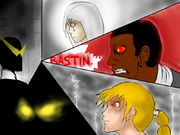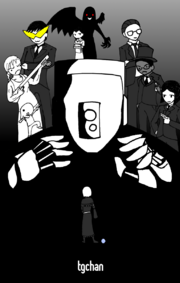Rastin-Vresch Continuity: Difference between revisions
No edit summary |
mNo edit summary |
||
| Line 6: | Line 6: | ||
==Canon== | ==Canon== | ||
Kara Quest, Nic Quest, and Apoc are the official story on the continuity. Blaze Quest never really got off the ground, and as such, is generally ignored. The Protagonist Dies was, in [[ | Kara Quest, Nic Quest, and Apoc are the official story on the continuity. Blaze Quest never really got off the ground, and as such, is generally ignored. The Protagonist Dies was, in [[Bromeliad]]'s words, not very well thought out. Whether or not the events in it are canon is not currently known, so the events within it may not necessarily affect anything in Apocalyption. | ||
==Recurring Themes== | ==Recurring Themes== | ||
Revision as of 01:52, 1 July 2010
The Rastin Vresch Continuity is the name of the setting in which Rastin and Vresch are the main villains. The continuity has a lot of things that stay the same between each quest involved, and this page tries to compile those things, as well as help organize what happens when between the quests.
The Rastin-Vresch Continuity consists of Apocalyption, Blaze Quest, Kara Quest, NicQuest, and The Protagonist Dies. Chronologically, Kara Quest and NicQuest take place concurrently. Blaze Quest starts about 80% through the events of Kara Quest, making it mostly a sequel but also concurrent. Apocalyption takes place 16 years after the end of NicQuest, and The Protagonist Dies takes place another 10-20 years after that.
Canon
Kara Quest, Nic Quest, and Apoc are the official story on the continuity. Blaze Quest never really got off the ground, and as such, is generally ignored. The Protagonist Dies was, in Bromeliad's words, not very well thought out. Whether or not the events in it are canon is not currently known, so the events within it may not necessarily affect anything in Apocalyption.
Recurring Themes
In addition to the ones explained in depth below, each of the quests in this setting places a strong emphasis on cause and effect. Everything effects everything else. And the protagonists rarely have any idea just how far reaching the consequences of their actions truly are.
The Science of Magic
The rules of magic are most thoroughly explained in Apocalyption, but in general, they apply to each of the quests. Magic consists of a few schools of magic: Abjury, Conjury, Divination, Evocation, Necromancy, Psionics, and Transmutation. Each one has their own drawbacks, their own focus, and their own mana backlash.
- Abjury (Abjurer): Abjury magic is the broadest school of magic. It involves making magical wards and effects by inscribing runes onto a surface, and then activated them from afar. Nearly anything can be accomplished with Abjury, but it takes a very long time to set up a runic circle, and the mildest interference can disrupt the spell. However, it is worth noting that Abjury magic does not have a mana backlash - its simple success or fail.
- Conjury (Conjurer): Conjury magic is the creation of material where none existed. To successfully conjure, you must bind the new creation to yourself, and then create the conjury. If the conjury is damaged, it'll cause mana backlash, damaging the bound part of the conjurer's body.
- Divination (Seer): No information known.
- Evocation (Warmage): No information known.
- Necromancy (Necromancer): Necromancy magic is manipulation of the soul. Mana backlash involves considerable aging.
- Psionics (Psychic): Psionics is the ability to do extraordinary things with just a thought. It is the quickest of the magics by far, and also one of the most narrow. Psychics can use up to 20% of their power without suffering any mana backlash. Their mana backlash varies from minor headaches to blindness to complete unconsciousness to their head exploding, depending on just how extremely they used their power. They tend to experience rapid power growth shortly after obtaining their powers, but after time the growth becomes much more gradual.
- Transmutation (Transmuter): Transmutation magic consists of altering things that already exist. As time goes on, transmutations become steadily more and more difficult to maintain, and eventually unravel, often with disastrous consequences. Its best to end a transmutation before it unravels.
Sin
The Seven Sins tend to play a role in the various series, in differing ways. The most prominent example is the Seven Sammich Sinners, who each embody one of the deadly sins. They are all siblings, and play a moderately large role in whichever quest they appear in. Kara Quest has Prevous [Gluttony], Jeslyn [Greed], and Laloth [Sloth]. NicQuest has Tyrael [Pride] and Tamana [Envy]. And Apocalyption has Naveen [Lust] and Kal Royale [Wrath].
In addition, Vresch himself is a demon of Pride, who seeks to be the best for his own sake.
Rastin
The grand troll. He lives for the sake of living, and enjoys life as much as he can. His greatest joy? Trolling the fuck out of you.
Vresch
The mastermind behind everything. A demon of technology, his domain is "The creations of man." With how technological the modern world is, this gives him nearly limitless power. His sin is Pride, and he is dead set on being the best in the world... and as The Protagonist Dies has shown, the entire galaxy as well.
Chronology
The threads arranged in approximate order of happening. Of the 4 quests involved, only Kara Quest is currently completed.
Kara Quest:[ Chapters 1-2 ]
Kara Quest:[ Chapter 3 ]
Nic Quest:[ Chapters 1-2 ]
Kara Quest:[ Interlude ]
Kara Quest:[ Chapter 4 ]
Nic Quest:[ Chapter 3 ]
Blaze Quest:[ Chapter 1 ]
Nic Quest:[ Chapter 4 ]
Kara Quest:[ Chapter 5 ]
Nic Quest:[ Chapter 5 ]
Apocalyption:[ Chapter 1 ]
Apocalyption:[ Chapters 2-4 ]
Apocalyption:[ Chapters 5-6 ]
Apocalyption:[ Chapters 7-9 ]
Apocalyption:[ Chapters 10-12 ]
Apocalyption:[ Chapters 13-14 ]
The Protagonist Dies:[ Prologue ]
The Protagonist Dies:[ Chapter 1 ]
The Protagonist Dies:[ Chapter 2 ]
The Protagonist Dies:[ Chapter 3 ]
The Protagonist Dies:[ Chapter 4 ]
The Protagonist Dies:[ chapter 5 ]

